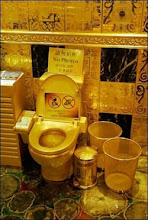
Britain, first an apology.
Like our blessed Prime Minister, The Golden Latrine watched the UK riots unfold from a shadowy lair in the sunny Tuscan hills, a glass of flat prosecco in one hand and smartphone in the other. As England smouldered and its anxious citizens cried out for a State of the Nation blog, I lay sweating in paradise, perversely wishing I was there.
After getting past the initial "What, in the name of David Dimbleby, is going on?", the question I, like everyone else, wanted answering most was simple: Why is this happening? As the initial suggestion that this was a political protest over the shooting of Mark Duggan faded, a large section of the population (and the media) quickly reached a consensus that the rioting was "mindless" - an atavistic outpouring of rage from an animalistic underclass incapable of higher thought.
Such was the hysteria surrounding the riots and looting, that the suggestion was that even looking for causes was wrong. As Owen Jones said in a Newsnight interview with an inflammatory David Starkey: "there's a dangerous climate at the moment, I think, to even begin to understand the underlying social and economic causes is seen as justifying mindless thuggery" (and in this context Labour leader Ed Miliband deserved a great deal of credit for not giving in to the temptation to sensationalise, telling a crowd in Manchester: "We have got to look into the causes, why people are going around doing this. And I think there are a complex number of causes").
There were, though, commentators who did try and delve into the rioters' motives. The idea of the rioters' "mindlessness" was challenged by Dan Hind in his piece for Al Jazeera and Russell Brand, while in The Guardian Zoe Williams produced a brilliant piece on the psychology on the rioters and looters.
Williams set out the three common positions on the riots: the authoritarian response (riots as glorified mugging, carried out by a generation with a colossal sense of entitlement, and enabled by a limp-wristed, mealy-mouthed criminal justice system); (the liberal response (as exemplified by youth worker Camila Batmanghelidjh's piece in the Independent); and a more pragmatic response (summed up perfectly by blogger Sarah Carr:
"the media coverage makes them look like cunts. And perhaps many of them are. But even cunts can have legitimate grievances. Maybe they’re destroying stuff because they have no other channel to express their sense of hopelessness and rage at their situation. Or maybe they and their friends just like the thrill of a ruckus with the added bonus of free gear."
The best example of the authoritarian response unquestionnably came from Golden Latrine favourite Melanie Phillips, who, in a truly batshit crazy piece in the Mail blamed Labour, lone parents, "ultra-feminists", the welfare state, 'victim culture' and multiculturalism for the rioting.
What was really interesting in Williams' piece, though, was her discussion of whether the riot was nihilistic ("everything is shit and pointless") or consumeristic ("I want a new pair of trainers"). She persuasively argued that the two were not necessarily contradictory, quoting marketing and consumer expert Alex Hiller:
If you look at Baudrillard and other people writing in sociology about consumption, it's a falsification of social life. Adverts promote a fantasy land. Consumerism relies upon people feeling disconnected from the world.
And personally I think that's bang on the money. The UK riots saw young people turning that advertising fantasy world into a reality, which is why the whole thing looked so unreal, like a computer game. And the sense of rioting and looting as a great adventure cannot be overlooked - just read Kevin Sampson's piece on his part as a youngster in the Toxteth riots:
In all the hours and pages of reportage since rioting returned to our cities last weekend, not one commentator seems to have touched upon the sole unifying factor that fuels and drives such unrest – excitement, fun, teenage kicks. In 1981 I could have cited unemployment (check), low-income, single-parent family (check), experience of police brutality (check) as factors in my participation, but none of the above even remotely came into my thinking then and I doubt it is stoking today's unrest, either.
I went along in 1981 because I was swept away by the mind-blowing buzz of mob mayhem. There's no justifying that – in the crudest terms such behaviour is quite simply wrong – but try telling that to a 15-year-old on a mountain bike. To him or her, it's like a Wii game come to life – a hyper-real version of GTA. You taunt the police until they chase you, then you leg it and regroup. Some of the more radical kids will throw rocks and set cars and wheelie bins alight to get them going, but sooner or later the "bizzies" (police) will charge.
It makes you think, eh?


